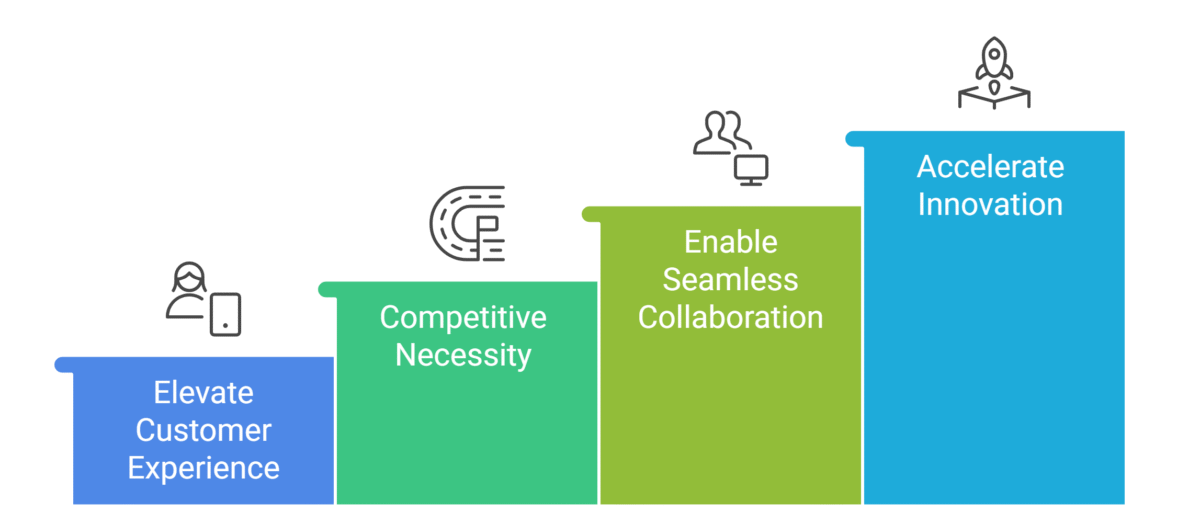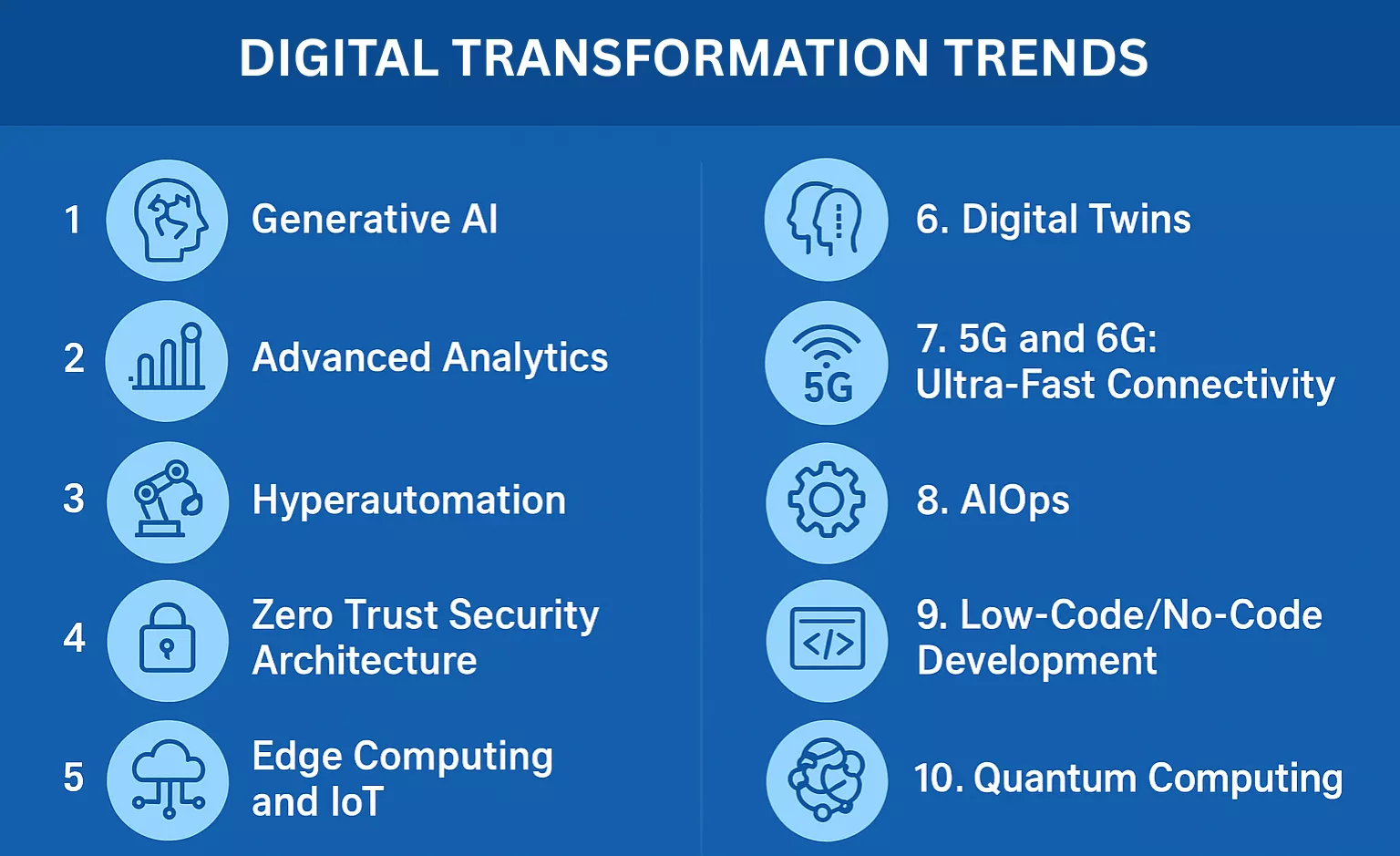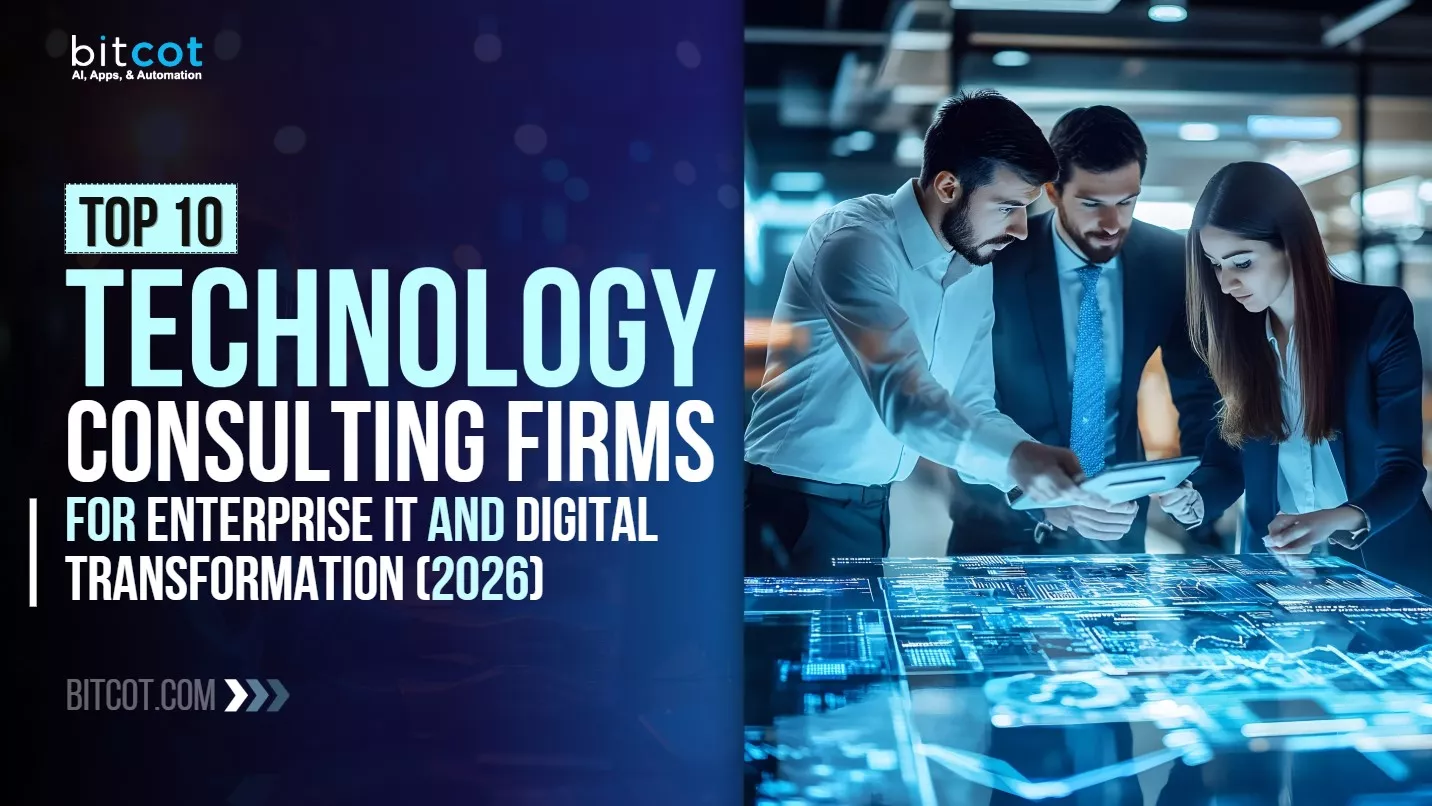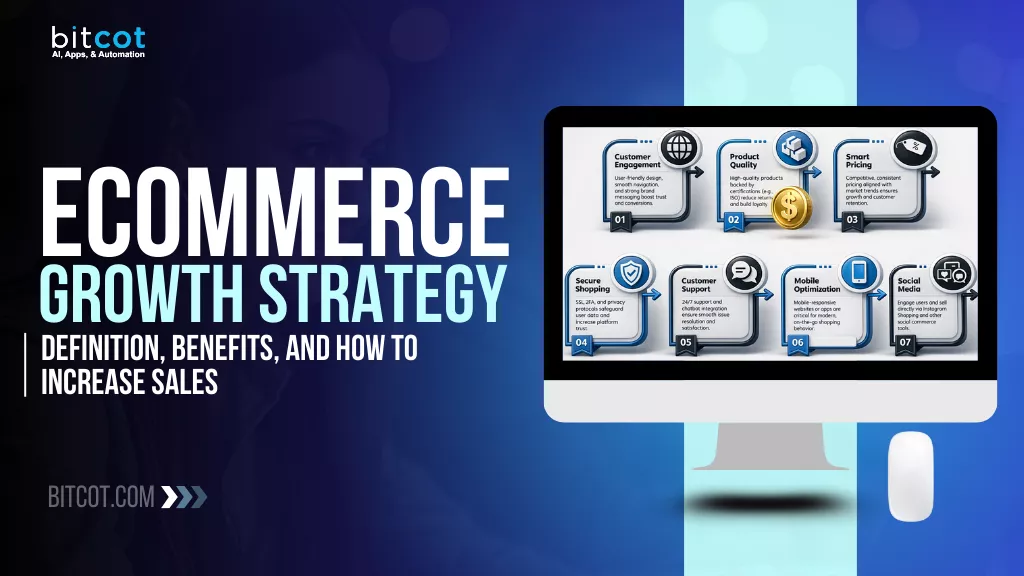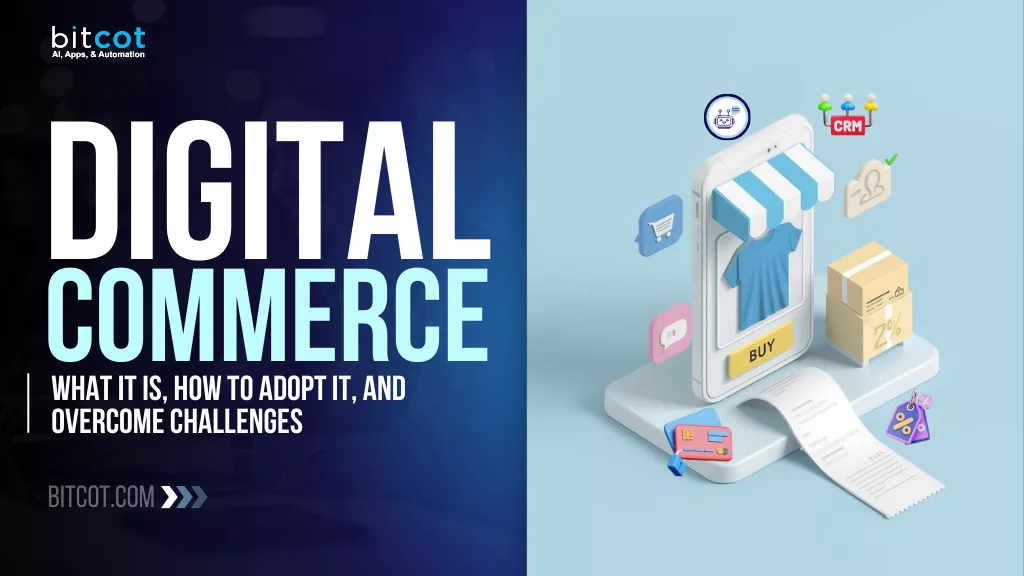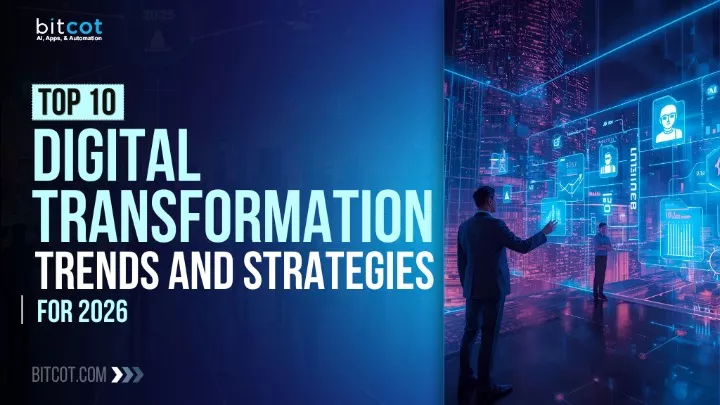
Here’s what nobody tells you about digital transformation: knowing about it and actually doing it are two completely different things.
Look, you’ve probably read dozens of articles about digital transformation. You’ve sat through webinars. Maybe you’ve even had internal meetings about “going digital.” But here’s the question that matters: What have you actually implemented?
If you’re like most businesses, the answer is uncomfortable. While you’ve been planning, your competitors have been executing. They’re using AI to respond to customers in seconds. They’re automating processes and making data-driven decisions while you’re still stuck in spreadsheets.
Here are the numbers that should worry you:
In 2026, 90% of organizations are actively pursuing digital initiatives. 87% of executives consider transformation mission-critical (McKinsey, IDC). Global spending will hit $2.8 trillion by 2025, jumping to $3.4 trillion by 2026, and reaching $4.5 trillion by 2030.
But here’s the kicker: 70% of these initiatives fail.
Why? Because most businesses treat digital transformation like a checklist instead of a strategy. They invest in technology without understanding how it fits their needs or solving actual problems.
The gap between winners and losers is growing exponentially. Every month you wait, your competitors get better at leveraging AI and deploying solutions. This isn’t about being cutting-edge anymore. It’s about survival.
Whether you’re a technical leader dealing with outdated systems, an executive trying to make sense of tech buzzwords, or a business owner watching profits shrink, the challenge is the same. You know you need to transform. You just don’t know where to start or who to trust.
That’s exactly where Bitcot comes in.
Instead of generic solutions that look good in PowerPoint but fail in practice, Bitcot delivers customized transformation strategies that actually work. Real implementations. Measurable results. Proven ROI.
This guide breaks down the 10 digital transformation trends reshaping business in 2026. Not theory. Not hype. Just practical, proven technologies driving real results right now. More importantly, you’ll learn how to implement them without becoming another failure statistic.
Ready? Let’s dive in.
How Digital Transformation Drives Customer-Centric Business Growth
Digital transformation solutions leverage technology to create enhanced customer experiences and reshape business processes. Companies use cutting-edge technologies to update their strategies for the digital era and achieve enterprise modernization.
Modern digital transformation strategies represent a significant shift from traditional sales and marketing approaches toward genuine customer-centricity. Customer priorities now drive corporate goals directly. Businesses align their objectives with what customers truly need through continuous innovation and iterative improvement.
Successful digital transformation replaces paper-based workflows with sophisticated mobile and web applications. This makes organizations more efficient, sustainable, and environmentally responsible. The shift requires strong data protection through secure cloud infrastructure. Teams can access data seamlessly without the confusion of spreadsheets or the limitations of physical documents.
Understanding these foundational principles sets the stage for exploring why digital transformation has become a business imperative rather than an optional initiative.
Why Digital Transformation is Essential for Business Success
Understanding why your organization should embrace modern technological evolution requires examining key business drivers:
Elevating Customer Experience
Customer satisfaction increasingly determines business success. Organizations using digital technologies operate more efficiently, deliver superior service quality, and respond faster to customer needs.
Successful business digital transformations consistently prioritize user requirements. In competitive markets, consumers prefer businesses that offer personalized, relevant experiences. Technology platforms help you understand your audience more deeply through cloud-based analytics, enabling you to customize products and services precisely to their preferences.
Competitive Necessity in Modern Markets
Today’s digital environment makes transformation essential rather than optional. Organizations must adapt to emerging technology trends to remain competitive. Business models are evolving from traditional operations to digital-first approaches.
Technologies and methods must evolve alongside business needs. Legacy technologies no longer meet the demands of modern organizations.
Embracing the digital revolution means implementing current technologies that address immediate needs while preparing you for the future of digital transformation and scalability.
Enabling Seamless Collaboration
Modern technology encompasses internal communication, team collaboration, and external partnerships. AI-powered collaboration platforms facilitate effective communication regardless of business model or organizational size.
Digital solutions coordinate team activities, ensure projects finish on time, boost productivity, and enable efficient cross-departmental communication, which is particularly crucial for distributed workforces.
Accelerating Innovation and Time-to-Market
Technological modernization dramatically reduces the time required to bring new products and services to market. Organizations leveraging cloud computing, agile methodologies, and DevOps practices can iterate faster, test ideas quickly, and respond to market changes with unprecedented speed.
Development cycles that once took months now complete in weeks or days. Companies gain significant advantages through rapid prototyping, continuous integration, and the ability to experiment and learn from failures quickly based on real-time customer feedback.
With these compelling reasons established, let’s explore the specific technologies and trends that are defining digital transformation in 2026.
Top 10 Digital Transformation Trends for 2026 and the Future
As digital business trends evolve, staying current with emerging technologies becomes critical for business success. From breakthrough technologies to transformative innovations, organizations leverage modern solutions to redefine success in highly connected markets. Understanding the digital transformation future helps businesses stay ahead of the curve.
Bitcot ensures your organization embraces the technological trends shaping 2026 and beyond. Explore these top digital business trends driving smarter, more efficient futures.
Generative AI
Generative AI is transforming everything. Content creation. Customer interactions. Product design. Software development. All of it.
This technology lets companies maintain competitive advantages through accelerated innovation. From personalized marketing campaigns to automated code generation and design, generative AI helps businesses scale innovation while cutting costs and shortening time-to-market.
Real-world applications:
- Automated, contextually relevant content generation
- Personalized customer experiences at scale
- Rapid prototyping and design iteration
- Accelerated code development
Advanced Analytics
Big data analytics with AI-enhanced capabilities remains fundamental to modern business success.
Businesses leverage predictive and prescriptive insights to drive growth, optimize strategies, enhance customer experiences, and make confident data-driven decisions.
Here’s what makes today’s analytics platforms different: real-time processing, natural language queries, and automated insight generation. Data becomes accessible across all organizational levels, not just to data scientists.
Key features you need to know:
- Real-time data processing
- Predictive analytics that actually work
- Prescriptive recommendations for action
- Self-service analytics tools for everyone
Hyperautomation
Hyperautomation has evolved way beyond traditional Robotic Process Automation (RPA).
It combines RPA with AI, machine learning, and process mining. This advancement streamlines entire business workflows rather than just isolated tasks.
By enabling comprehensive end-to-end automation, organizations free human resources for strategic innovation and creative problem-solving while substantially cutting operational expenses.
What you get:
- Intelligent process automation
- AI-powered decision engines
- Process discovery and mining
- Advanced analytics and optimization
Zero Trust Security Architecture
Cybersecurity isn’t just important in digital transformation. It’s absolutely critical.
Protecting data and infrastructure from evolving threats proves crucial for successful transformation and sustainable innovation.
Modern cybersecurity strategies emphasize Zero Trust Architecture. The principle? Assume no user or system is inherently trustworthy. Implement continuous verification. Secure access throughout all organizational layers.
Zero Trust core principles:
- Never trust, always verify
- Least privilege access always
- Micro-segmentation of networks
- Continuous monitoring and validation
Edge Computing and IoT
Edge computing and IoT are revolutionizing connectivity by processing data near its source rather than relying exclusively on centralized cloud infrastructure.
This trend ensures faster response times, reduced latency, and enhanced reliability.
Industries from manufacturing to healthcare leverage edge computing for real-time decision-making, improved security, and operational efficiency.
The advantages:
- Ultra-low latency processing
- Optimized bandwidth usage
- Enhanced data privacy
- Improved system reliability
Digital Twins
Digital twins let organizations create virtual replicas of physical systems, products, or processes.
This innovative technology enhances efficiency, monitoring, predictive maintenance, and decision-making across industries.
From manufacturing facilities to entire urban infrastructures, digital twins provide real-time insights and enable simulation-based optimization without disrupting actual operations.
Where they work best:
- Predictive maintenance
- Performance optimization
- Scenario testing and planning
- Product lifecycle management
5G and 6G: Ultra-Fast Connectivity
5G networks are hitting mainstream adoption while 6G development progresses, pushing connectivity to unprecedented levels.
These advances revolutionize communication, data transfer, and enable autonomous vehicles, smart cities, and immersive technologies.
The enhanced bandwidth, minimal latency, and superior reliability of next-generation networks fundamentally enable other digital transformation trends to reach their full potential.
What these networks deliver:
- Ultra-reliable low-latency communications
- Massive IoT device connectivity
- Enhanced mobile broadband
- Network slicing for customized services
AIOps
Artificial Intelligence and Machine Learning lead digital transformation trends by automating complex workflows and enabling intelligent decision-making.
AIOps revolutionizes IT operations through real-time data analysis, predictive failure detection, and automatic performance optimization.
Modern AIOps platforms integrate seamlessly with existing infrastructure, delivering actionable insights that reduce downtime and improve operational efficiency by up to 40%.
Key benefits:
- Proactive incident management and prevention
- Automated root cause analysis
- Predictive maintenance capabilities
- Intelligent resource optimization
Low-Code/No-Code Development
Low-code and no-code platforms empower non-technical teams to create applications.
These platforms democratize software development. Business users can build applications, automate workflows, and innovate independently from IT departments. This significantly accelerates digital initiatives.
What you gain:
- Faster application delivery
- Reduced development costs
- Business user empowerment
- Optimized IT resource allocation
Quantum Computing
Quantum computing is transitioning from theoretical research to practical business applications right now.
This game-changing technology delivers unprecedented computational capabilities, transforming finance, healthcare, pharmaceuticals, and logistics.
Early adopters are exploring quantum algorithms for optimization challenges, drug discovery, advanced cryptography, and complex simulations impossible with traditional computing.
Real use cases:
- Complex optimization problems
- Molecular modeling and drug discovery
- Financial risk modeling and assessment
- Supply chain optimization
Partner with Bitcot to transform these trends into competitive advantages. We don’t just track emerging technologies; we implement them strategically to drive real business results.
While understanding individual trends is valuable, combining them into cohesive strategies amplifies their impact exponentially.
Advanced Digital Transformation Strategies for Enterprise Growth
Beyond adopting individual technologies, successful enterprises implement comprehensive strategies that align digital initiatives with long-term business objectives. These advanced approaches enable organizations to build sustainable competitive advantages while maintaining agility in rapidly changing markets.
Composable Enterprise: Modular Business Architecture
Composable architecture enables rapid reconfiguration of business capabilities using modular components. This accelerates innovation and reduces dependencies on legacy systems.
Adoption Strategy:
- Follow MACH principles (Microservices, API-first, Cloud-native, Headless)
- Use low-code platforms for front-end agility
- Build cross-functional teams for unit-specific deployments
Integrated Hyperautomation: Enterprise-Wide Intelligence
Scaling hyperautomation across entire organizations rather than limiting it to departmental silos creates exponential value. In 2026, enterprise-wide automation serves as essential infrastructure for business scalability and sustained cost optimization.
Getting Started:
- Conduct comprehensive process mapping across all departments
- Deploy enterprise platforms such as UiPath, Power Automate, or Automation Anywhere
- Establish clear KPIs including cycle time reduction, measurable ROI, and quantified human-in-loop contributions
Agentic AI: Autonomous Business Intelligence
Generative AI now extends beyond content creation into autonomous systems that make decisions, orchestrate workflows, and deliver hyper-personalized experiences without constant human oversight. Enterprises embed agentic AI within self-learning platforms, intelligent virtual agents, and autonomous business processes.
Implementation Roadmap:
- Launch targeted pilots in customer support operations, back-office processes, or knowledge management systems
- Assess enterprise-grade platforms including OpenAI, Anthropic Claude, or Google Gemini
- Focus automation efforts on high-cost, repetitive workflows with clear ROI potential
Strategic Digital Transformation: Ethics, Sustainability, and Innovation
Successful 2026 enterprises balance technology advancement with ethics, sustainability, and strategic alignment:
Cross-Industry Collaboration: Ecosystem Innovation
Organizations are working together beyond traditional boundaries. Fintech collaborates with retail, healthcare partners with technology providers, and manufacturers work with logistics companies for enhanced service delivery.
Corporate Digital Responsibility (CDR)
Organizations are integrating responsible data practices, ethical AI implementation, and sustainability into transformation strategies. CDR has evolved from a best practice to a competitive advantage and regulatory requirement.
Builder Mentality: From Pilots to Production
Leading enterprises are transitioning from experimental projects to embedded digital strategies. Success requires cross-functional digital builders rather than passive technology users.
Data Governance and Privacy Excellence
Modern enterprises recognize that data governance and privacy protection serve as competitive advantages rather than obstacles. Organizations implementing comprehensive data management frameworks build customer trust while ensuring regulatory compliance across global markets.
Successful strategies balance accessibility with security through clear data ownership, privacy-by-design principles, and transparent usage policies. This approach satisfies regulations like GDPR and CCPA while unlocking full data value and maintaining stakeholder confidence.
Strategic Alignment Checklist:
- ✓ Is transformation aligned with core organizational values?
- ✓ Is AI embedded with appropriate explainability and ethics?
- ✓ Have ecosystem partnerships been evaluated beyond your immediate sector?
These strategic frameworks come to life when we examine how leading organizations across different industries have successfully implemented them.
Digital Transformation Success Stories Across Industries
Real-world implementations demonstrate how organizations across diverse sectors leverage digital technologies to solve specific challenges, improve operational efficiency, and create new value propositions. These success stories illustrate the tangible impact of strategic digital transformation initiatives.
Healthcare Advancement
- Edge computing powers real-time ICU monitoring with minimal latency, driving the next wave of healthcare digital transformation.
- AI diagnostics accelerate anomaly detection, improve accuracy, and expedite patient care through intelligent automation and data-driven insights.
Financial Services Transformation
- AI-powered virtual agents manage thousands of real-time queries, enhancing engagement while reducing operational burden
- Composable platforms accelerate product launches and compliance in regulated environments
Manufacturing Excellence
- Hyperautomation streamlines production through automated quality control, material handling, and predictive maintenance
- AR/XR solutions enable remote expert assistance, reducing costs and downtime
Automotive Innovation
- Digital twins simulate performance, optimize manufacturing, and reduce recalls
- Connected platforms enable predictive maintenance, personalized infotainment, and real-time diagnostics
Energy Sector Innovation
- IoT and AI integration monitors grid performance, predicts failures, and manages real-time demand
- Digital twins optimize power plant assets and reduce operational risks
Telecommunications Optimization
- 5G + Edge + AI combinations optimize traffic, detect anomalies, and automate restoration
- Low-code platforms launch self-service portals and streamlined onboarding
Government Modernization
- Cloud-powered citizen portals simplify service delivery and reduce paperwork and response times
- Blockchain ensures transparent, tamper-proof records for land, legal, and voting data
These success stories demonstrate that digital transformation delivers measurable results across every sector when implemented strategically with the right partners.
Conclusion: Partner with Bitcot for Digital Transformation
So what does this mean for you? Embracing digital technology trends drives business disruption and revenue growth through strategic transformation.
New digitalization trends emerge every year, offering exponential growth potential. Successful digital transformation delivers software monetization, data-driven insights, enhanced customer satisfaction, and organizational agility.
This is where Bitcot makes the difference.
We specialize in guiding businesses through digital transformation journeys with customized solutions and expert consultation. Our certified technology consultants deliver exceptional quality while driving measurable client satisfaction.
We use cutting-edge technologies and industry best practices to create scalable, innovative solutions that address your unique requirements. Not generic templates. Real solutions for real business challenges.
Whether you’re launching your corporate digital transformation or accelerating existing initiatives, Bitcot serves as your trusted partner. We support strategic planning, implementation, and optimization of digital transformation initiatives that deliver actual results and sustainable competitive advantages.
Ready to transform your business?
Contact Bitcot today to discuss using the latest digital transformation trends to achieve your business objectives and maintain market leadership. Let’s turn these trends into your competitive advantage.
Digital Transformation FAQs: Your Questions Answered
What is digital transformation?
Digital transformation uses digital technologies across all business areas, fundamentally changing operations and value delivery to customers. It fosters cultural and operational evolution. Think of it as reimagining how you do business in the digital age.
Why is digital transformation important in 2026?
With 90% of organizations pursuing digital initiatives and transformation accounting for 40% of all technology spending, digital transformation is essential for competitive survival, operational efficiency, and meeting evolving customer expectations. However, only 30-35% of transformations fully succeed, making strategic implementation critical.
What are the top digital transformation trends?
Leading trends include generative AI, advanced analytics, hyperautomation, zero trust security, edge computing with IoT, digital twins, 5G/6G networks, AIOps, low-code/no-code platforms, and quantum computing. Each offers unique advantages depending on your industry and business needs.
How can Bitcot help with digital transformation?
Bitcot provides end-to-end digital transformation services including strategy development, technology implementation, process optimization, and ongoing support to ensure measurable business outcomes. We don’t just advise. We execute and deliver results.
What industries benefit most from digital transformation?
All industries benefit from digital transformation, with particularly significant impacts in healthcare, finance, manufacturing, retail, telecommunications, energy, automotive, and government sectors. Financial services and technology sectors show the highest digital maturity, with 75% of banks actively transforming. But every industry faces the same challenge: adapt or fall behind.

